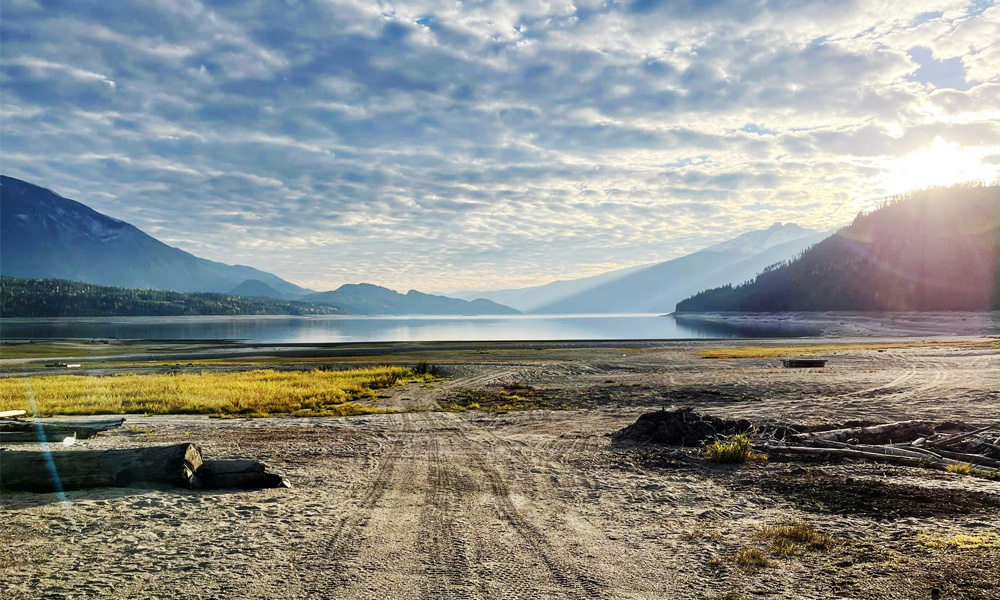
UBC Okanagan faculty and community partners are hosting a two-day virtual symposium about the ongoing Columbia River Basin Treaty.
As the clock ticks on the existing Columbia River Treaty, UBC Okanagan faculty members are preparing to discuss the river, its environmental effects, treaty operations and how climate change has affected the waterway throughout BC, Washington State and Oregon at a two-day virtual symposium scheduled for Nov. 29 and 30.
The symposium will cover many aspects of the Columbia River including the long and storied history of the 60-year Columbia River Transboundary Treaty between Canada and the US, governance, vitality and the future of this 2,000-kilometre-long body of water that stretches across the 49th parallel.
The Tribes and First Nations Advisory Committee, which includes members such as Pauline Terbasket of the Okanagan Nation Alliance and DR Michel from the Upper Columbia United Tribes, among others, has been pivotal in shaping the symposium’s topics and speaker selection. They’re drawing from extensive knowledge and experience in the Columbia River Basin and their guidance reflects over a decade of trusted and reciprocal relationships, which are fundamental to the ongoing dialogues and gatherings organized in the Basin.
Dr. Joanne Taylor, a Postdoctoral researcher in UBCO’s Irving K. Barber Faculty of Arts and Social Sciences, is the lead event organizer. She says a new treaty is imperative for First Nations, Tribes, Basin residents and the environment.
Can you explain what is at stake for residents of the Columbia River Basin?
Residents have numerous concerns including flood control and flexibility in how the river is operated. Sixty years ago, when the treaty was first put into action, the First Nations and public were not consulted or included in negotiations as the treaty was designed solely for flood control and hydropower between the two countries.
Controlling the Columbia River caused irreparable damage to the environment, decimated First Nations’ and Tribes’ fisheries and cultures, and displaced more than 2,000 people while submersing viable farmland in the Arrow Lakes area that was flooded when one of three Columbia treaty dams—the Hugh Keenleyside—was built in 1968 under the treaty.
This speaks to the heart of my research into food and water security for both colonial settlers and First Nations. Although the Grand Coulee Dam built prior to the treaty killed fish passage, we cannot ignore the unfair operations of dams in the area.
Many residents are calling for the removal of dams as has been done on the Klamath River along the Oregon-California border and the Elwa River in Washington State where anadromous (migrating) fish species returned naturally and almost immediately.
What is concerning about the current state of the basin?
Along the 230-kilometer-long Arrow Lakes reservoir, we are seeing some of the lowest water levels ever which are exposing First Nations’ archeological sites, relics of lost homes and farmland on dried river beds, and thousands of fish that are dying due to a lack of normal flow and water levels. Basin residents are deeply saddened and want to see flexibility in how the river is operated which would include consulting Sovereigns—a call that is consistent with the United Nations Declaration on the Rights of Indigenous Peoples.
How Canada and the US proceed in creating a revised treaty is an opportunity for reconciliation between Canada and Indigenous Peoples. We need to think about the salmon, the river and what legacy we are leaving to our children, seven generations into the future.
When is a new treaty expected to be announced?
After 19 rounds of negotiations that began in 2018, both US President Joe Biden and Prime Minister Justin Trudeau have encouraged treaty negotiators to work hard to create a newly revised transboundary agreement by Sept. 16, 2024. This date is when the guaranteed flood control component of the current treaty expires and reverts to on-call; something that neither country necessarily wants to see as they wade into unknown waters, literally. Hydropower generation continues indefinitely until the treaty is renewed or expires. Negotiators are now meeting on a weekly basis.
What is being organized by researchers and partners of the Columbia Basin?
We have organized a two-day virtual event where Indigenous voices will join academics, community and government leaders, and residents of the Columbia River Basin in a non-partisan forum that will discuss the future of the river and its resources.
Who will be speaking and what will be discussed at this event?
This event is organized by UBCO, the Universities Consortium on Columbia River Governance, the One River Ethics Matter Project and the North American Youth Parliament for Water.
We will also have presentations from people across the basin and the globe, including those from Tribes and First Nations, concerned youth, not-for-profit representatives and individuals from private and public sector businesses.
Some of the topics that will be discussed are Indigenous-led salmon revitalization initiatives in the basin, water quality in the Elk and Kootenai/y watersheds, global perspectives on governance models, ethical and intergenerational aspects of public engagement in water governance and other pressing issues facing the third largest watershed in North America.
Through open invitations to not only basin residents but to participants globally, this symposium is designed to engage a broader public through synthesis, exchange, networking and facilitated dialogues between and beyond the Columbia River Treaty, and will act as a catalyst for an in-person gathering that organizers are currently considering for next year.
How can people learn more?
For more information and to register, visit columbiabasingovernance.org.